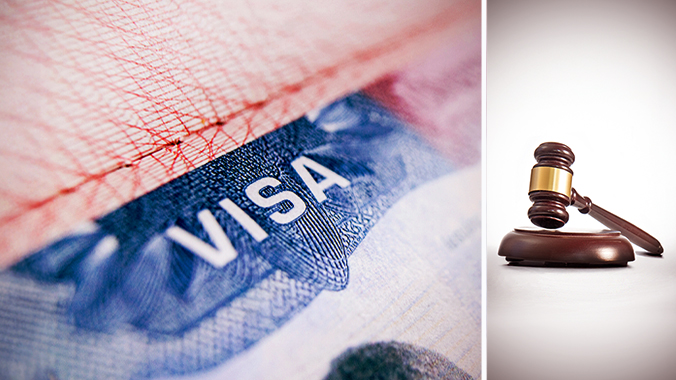Tariffs and Trade Disruption: Legal Strategy from Enforcement to Innovation




3 hour CLE
Get this course, plus over 1,000+ live webinars.
Learn More
Program Summary
Session I - Navigating Tariff Impacts and Risk Mitigation Strategies – Molly O’Casey
This session will explore the evolving landscape of U.S. tariff enforcement, with a focus on the broader economic and legal implications of reciprocal tariffs imposed on major trading partners, including China and USMCA member countries (Canada and Mexico). As tariff structures shift in response to geopolitical tensions, national security priorities, and trade negotiations, businesses face increasing exposure to cost volatility, supply chain disruptions, and regulatory scrutiny. Participants will gain a practical understanding of the current scope and exceptions under the reciprocal tariff regime, along with real-world strategies to identify, manage, and mitigate tariff risk. The session will also highlight the most common errors companies make when attempting mitigation and discuss the rising role of coordinated enforcement actions between U.S. Customs and the Department of Justice, signaling a more aggressive federal posture toward trade compliance violations. This session is essential for attorneys advising clients in import-heavy sectors, regulated industries, or global operations affected by complex trade dynamics.
Key topics to be discussed:
- Scope of the reciprocal tariffs: Current status and exceptions
- Reciprocal tariffs and China (new)
- Tariff mitigation strategies
- Top 3 tariff mitigation mistakes companies make
- Enforcement actions: Increase in cooperation between customs and Department of Justice
Session II - Managing Tariff Disputes through Contracts and Litigation Strategies – Brandon Krajewski
This session will focus on managing tariff-related disputes through both contractual mechanisms and litigation strategies. Participants will learn how to proactively structure contracts to allocate tariff risks and use force majeure clauses effectively. The discussion will also address active court cases and provide guidance on navigating the choice of law issues in tariff disputes. Attendees will explore strategies for obtaining exemptions to reciprocal tariffs, as well as the strategic use of injunctions during litigation.
Key topics to be discussed:
- Contract analysis for tariff issues
- Choice of law analysis in tariff disputes
- Active court cases involving tariffs
- Managing tariff disputes
- Injunction practice
Session III - Innovation vs. Distortion: An Integrated Approach to Trade, Antitrust, and IP Strategy – Alden F. Abbott
This session will explore how tariffs can be strategically used to counteract Anti-Competitive Market Distortions (ACMDs)foreign government policies that artificially favor domestic industries, suppress fair competition, and distort international trade. Drawing on both legal and economic perspectives, the session will examine how empirical models can help quantify these distortions and justify reciprocal tariffs that restore competitive balance—especially in the face of China’s state-driven trade practices and systemic IP theft. It will also consider how strengthening American patent protections and refining antitrust policy to better accommodate innovation and dynamic efficiencies could enhance the U.S. trade posture. Attendees will gain insight into how trade, antitrust, and intellectual property strategies can be better integrated to safeguard domestic markets and support long-term economic growth.
Key topics to be discussed:
- Using tariffs to counteract anti-competitive market distortions (ACMDs)
- Empirical modeling of trade distortions and tariff calibration
- Strengthening US Patent law and IP protections as trade tools
- Aligning antitrust policy with innovation and trade strategy
Session IV - Global Trade Defense: Legal Tactics for Surviving Intensified U.S. Tariff and Compliance Pressures – John Anwesen
As U.S. trade enforcement intensifies, companies operating globally must navigate an increasingly complex web of tariffs and customs scrutiny. This session will explore under-addressed but high-risk areas including who bears the duty liability, how to exercise reasonable care to avoid liability, and how to properly determine and declare Country of Origin both generally and under the USMCA for trade with Canada and Mexico.
The session will also cover the separate set of "origin" rules and authorities applicable to payment of antidumping and countervailing duties, as well as enforcement via anticircumvention investigations. Attendees will learn about enforcement mechanisms used by the U.S. Customs and Border Protection; the Department of Commerce; and the Department of Justice, including the expanded application of the False Claims Act in prosecuting trade violations.
Participants will gain insights into how enforcement agencies coordinate to detect and penalize violations, and how businesses can proactively manage their exposure through compliance programs, audit readiness, and strategic engagement with regulators. Drawing on recent legal challenges and enforcement trends, this session will equip attorneys with strategies to defend clients, secure tariff relief, and avoid the most common pitfalls in today's enforcement environment.
The session will conclude with practical duty mitigation strategies, including tariff engineering, importing under a temporary import bond for export-purpose goods, duty drawback for imports later exported, and an introduction to Foreign Trade Zones. It will also address advocacy strategies, engagement with federal agencies, and litigation at the U.S. Court of International Trade.
Key topics to be discussed:
- Importer liability and reasonable care requirements
- Country of origin determination (general rules and USMCA)
- Anticircumvention investigations and evasion enforcement
- False Claims Act application to customs violations
- Duty mitigation strategies and exclusion processes
- Strategic engagement with agencies and litigation options
This course is co-sponsored with myLawCLE.
![]() Closed-captioning available
Closed-captioning available
Speakers
 Molly O’Casey | Holland & Knight
Molly O’Casey | Holland & Knight
Molly O’Casey is a trade attorney in Holland & Knight’s Washington, D.C., office. Ms. O’Casey focuses her practice on a broad range of transactional, litigation and regulatory compliance matters in the areas of U.S. customs laws, export controls, economic sanctions and embargoes, national security reviews and maritime.
Ms. O’Casey advises clients on a wide variety of import matters before the U.S. Customs and Border Protection (CBP), with a particular focus on tariff mitigation. These matters include seizures, classification, valuation and country of origin, as well as preferential duty treatment under the Generalized System of Preferences (GSP) and free trade agreements (FTAs).
In addition, Ms. O’Casey counsels’ clients on U.S. export controls laws, such as the International Traffic in Arms Regulations (ITAR) and the Export Administration Regulations (EAR), especially in the context of mergers and acquisitions (M&A). She has extensive experience with U.S. trade embargoes and economic sanctions administered by the U.S. Department of the Treasury’s Office of Foreign Assets Control (OFAC) and the U.S. Department of State.
Also, Ms. O’Casey counsels’ clients with government contracts and security clearances, especially in the defense space. This includes hosting Holland & Knight’s podcast on industrial security, “Are We All Clear? Facilitating Security Clearances.”
Ms. O’Casey is actively involved in Holland & Knight’s pro bono activities, through which she provides counseling to individuals on immigration matters.
Prior to Holland & Knight, Ms. O’Casey clerked at the U.S. Court of International Trade. Her previous experience also includes work at a boutique law firm and an international consulting firm, with an emphasis on customs issues and trade remedies. During law school, Ms. O’Casey was an associate editor for the Cornell International Law Journal.
 Brandon Krajewski | Quarles & Brady LLP
Brandon Krajewski | Quarles & Brady LLP
Brandon helps clients navigate complex commercial disputes with an unwavering focus on practical, efficient and business-savvy solutions. He has helped clients win cases in state and federal courts at the trial and appellate level, as well as through arbitration and mediation. His experience includes work in several industries, such as: Manufacturers and suppliers, health care providers and a wide range of technologies, including industrial equipment, telecommunications, medical devices and software development
Brandon partners with clients to understand their business goals and objections and develops sophisticated strategies to drive resolution of complex disputes, with a focus on aligning legal strategy with business purposes and client service expectations. With a deep understanding of state, federal and arbitral proceedings, Brandon gets results while making sure clients can focus on their business.
Brandon is co-chair of the firm’s Government and Commercial Contracts subgroup.
 Alden F. Abbott | Mercatus Center at George Mason University
Alden F. Abbott | Mercatus Center at George Mason University
Alden F. Abbott is Senior Research Fellow in the Mercatus Center at George Mason University. A widely published scholar and lecturer, he oversees the Center’s research on antitrust and competition policy. He also is the regular antitrust columnist for Forbes online and a Leader of the American Bar Association’s Antitrust Section. Prior to joining Mercatus, he served as General Counsel of the U.S. Federal Trade Commission. Mr. Abbott is a co-author (with Shanker Singham) of Trade, Competition, and Domestic Regulatory Policy (Routledge 2023), a unique study of the global interactions among antitrust, regulation, trade, and intellectual property laws. His current research focuses on artificial intelligence, innovation, and government-sponsored anticompetitive market distortions that undermine the global economy. He also is a member of the Growth Commission, a special research body that issues report on national economic policies that have slowed economic growth.
 John Anwesen | Lighthill
John Anwesen | Lighthill
John Anwesen is the Founding Shareholder of Lighthill. John is an advocate with a vision of a connected world. He has assisted many companies to remain competitive in the U.S. market, and even completely defeat import duties, through successful defense of their business. John strives to provide solutions for his clients by thinking outside the box and discovering those details that reframe the narrative of the bigger picture.
John advises on a variety of international trade matters, with a focus on antidumping (AD) and countervailing duty (CVD) proceedings, other trade remedy proceedings, such as Sections 232 and 301 investigations and duties, customs matters, export controls, and sanctions. John also defends clients in U.S. agency investigations and related litigation and dispute resolution. His background includes leading AD and CVD cases while working for the U.S. government, as well as advising and defending clients from a wide range of industries in the private sector. With a nearly decade-long involvement in international trade matters, John has valuable insights and technical knowledge to provide the highest product and service quality for his clients.
Agenda
Session I – Navigating Tariff Impacts and Risk Mitigation Strategies | 1:00pm – 2:00pm
- Scope of the reciprocal tariffs: Current status and exceptions
- Reciprocal tariffs and China (new)
- Tariff mitigation strategies
- Top 3 tariff mitigation mistakes companies make
- Enforcement actions: Increase in cooperation between customs and Department of Justice
Break | 2:00pm – 2:10pm
Session II – Managing Tariff Disputes through Contracts and Litigation Strategies | 2:10pm – 2:40pm
- Contract analysis for tariff issues
- Choice of law analysis in tariff disputes
- Active court cases involving tariffs
- Managing tariff disputes
- Injunction practice
Session III – Innovation vs. Distortion: An Integrated Approach to Trade, Antitrust, and IP Strategy | 2:40pm – 3:10pm
- Using tariffs to counteract anti-competitive market distortions (ACMDs)
- Empirical modeling of trade distortions and tariff calibration
- Strengthening US Patent law and IP protections as trade tools
- Aligning antitrust policy with innovation and trade strategy
Break | 3:10pm – 3:20pm
Session IV – Global Trade Defense: Legal Tactics for Surviving Intensified U.S. Tariff and Compliance Pressures | 3:20pm – 4:20pm
- Importer liability and reasonable care requirements
- Country of origin determination (general rules and USMCA)
- Anticircumvention investigations and evasion enforcement
- False Claims Act application to customs violations
- Duty mitigation strategies and exclusion processes
- Strategic engagement with agencies and litigation options
Preview
More CLE Webinars
Trending CLE Webinars


![The Litigator’s Guide to Evidentiary Objections: When to hold them and how to avoid mistakes (Including 1hr of Ethics) [2024 Edition]](https://miamidadebarcle.org/wp-content/uploads/2025/05/product_img_The-Litigators-Guide-to-Evidentiary-Objections-When-to-hold-them-and-how-to-avoid-mistakes-Including-1hr-of-Ethics-2024-Edition.jpg)







Upcoming CLE Webinars




























































